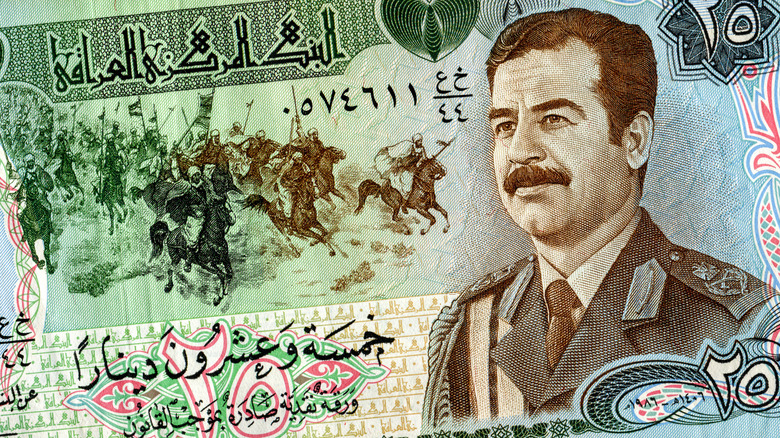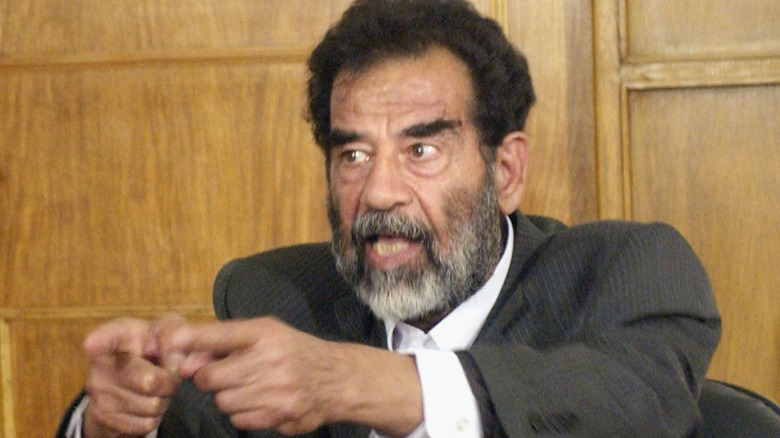The Truth About The Peaceful Saddam Hussein Heist
There's a reason why heist films are so fun, so popular, and depending on who you ask, so overplayed. The idea of heists are romantic in a sense, though most of us would never want to actually attempt pull one off in real life. A group of people gets together to mastermind an overly complicated plan to steal some great object or large sum of money, something goes wrong, but — ta-dah! — that was actually part of the plan the whole time. Stories about these meticulous thefts often center around a lovable, charismatic person who's only pulling "one more job" before "they're out" of the heist business for good. It's entertaining, but it's also not usually how heists go down in the real world.
Cat burglars and multi-million-dollar grifters are exceedingly rare outside of the film reels of Hollywood. Many large-scale thefts tend to happen at gunpoint. Think bank robberies and the like. Of course, peaceful heists do happen, but you don't hear about them often. And when you do, you aren't expecting them to be carried out under the orders of the leader of an entire nation. In the case of the peaceful Saddam Hussein heist, however, that's exactly how things happened. Let's take a look at how Saddam Hussein, the fifth president of Iraq, once took a note out of the pages of the best fictional thieves and stole a ridiculous amount of money from his own country's central bank.
The climate at the time
Before we even get into the peaceful Saddam Hussein heist, it's important to understand the climate of Iraq at the time. The heist took place in 2003. United States bombs landed on Baghdad hours after the heist took place, according to The New York Times. The country had been at war with the United States for less than two months, as noted by journalist Anthony Shadid (via Pulitzer), and taking down Hussein's regime was quick and brutal. After Baghdad had fallen, citizens tore through government buildings with a vengeance. For years, Hussein had held his people under thumb, abused them, and occasionally murdered them, and they were finally free of his tyranny.
With that much internal aggression pent up to support an outside attack that was moving in swiftly, it's no wonder that Hussein's heist went down when it did. The tyrannical leader had to have known his time was coming to an end, and funds would certainly make fleeing the country and hiding from accusations of war crimes that much easier. The country would be under the control of George W. Bush's U.S. military in no time, and the first wave of assaults took only three weeks to tear everything Saddam built down to the ground. There wasn't much time left for the falling dictator to do but to get out as fast as he could.
This heist was an easy one
Stealing money seems pretty easy when you're the leader of an entire nation, especially if you're Saddam Hussein, leading Iraq. With Hussein's reign being a dictatorship, it's difficult to say if this "heist" even broke any Iraqi laws. The guy pretty much had the power to do whatever he wanted to. Regardless, the theft blew up the media due to a mix of all eyes being on Iraq and the sheer fact that he pocketed what The Guardian says was 10 figures in cash.
Here's how it happened: At 4 a.m. on March 18, 2003, one of Saddam's sons showed up at the central bank under the dictator's direct orders. He and his crew then loaded up $100 million in Euros and $900 million in $100 bills. Quite a lot of cash, and nobody stood in their way while they did so. Of course, this was likely in the witnesses' best interest; chances are they weren't going to take prisoners lightly. The peaceful heist went off without a hitch, and Saddam got away with it, until he was caught in December 2003. After being found guilty of crimes against humanity, he was executed December 30, 2006.


